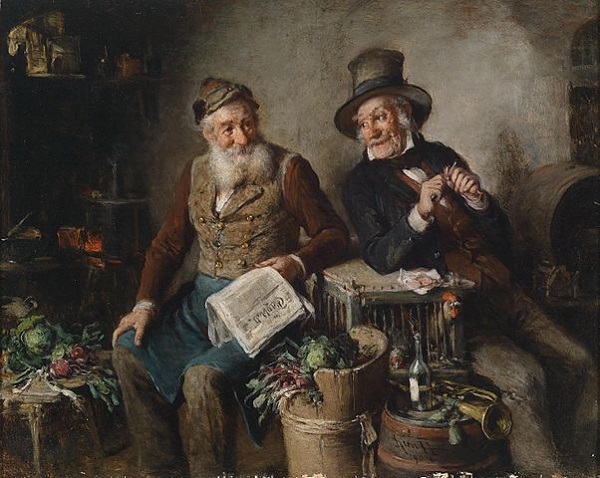Anthony T. Flood, The Root of Friendship: Self-Love and Self-Governance in Aquinas. Washington, DC: The Catholic University of America Press, 2014.
Whom should one love more: God, one’s neighbor, or oneself? When Jesus is asked which commandment is the greatest, he responds, “You shall love the Lord, your God, with all your heart, with all your soul, and with all your mind” (Mt 22:37). St. Thomas Aquinas explains that God is most deserving of love, because He is the supreme source of happiness for creatures (Summa Theologiae II-II q. 26, a. 3). He is infinite goodness and, therefore, infinitely lovable.
But what about one’s neighbor? The Christian emphasis on love of neighbor might suggest that one’s neighbor ought to be preferred to oneself. Having identified “the greatest and the first commandment,” Jesus continues, “And a second is like it, You shall love your neighbor as yourself” (Mt 22:39). Thomas notes that the phrase “as yourself” seems to imply that love for oneself is the model of love for another. And since “the model exceeds the copy,” he concludes somewhat surprisingly, “out of charity, a man ought to love himself more than his neighbor” (ST II-II q. 26, a. 4). Elsewhere, Thomas follows Aristotle and the book of Sirach in describing a friend as “another self” (Nicomachean Ethics b. IX , ch. 4; Sir 6:11). The phrase indicates a high estimate of friendship, but again self-love is presupposed as a kind of measure.
The fundamental role of self-love in the anthropology of St. Thomas is the topic of a new scholarly book by Anthony T. Flood, The Root of Friendship: Self-Love and Self-Governance in Aquinas. Influenced by the philosophy of personalism, Flood argues that Thomas’ theory of self-love can contribute to contemporary discussions of typically modern themes in philosophy, particularly, self-experience and personal autonomy or self-governance.
In Flood’s reading of Aquinas, “self-love constitutes the interior, heart, or primal self-experience of the person,” and “all other conscious experiences depend on the love-based self-relation” (17–18). To better understand Flood’s meaning, consider some fundamental points of Thomistic ethics. Human nature inclines toward certain basic goods—self-preservation, procreation, to know the truth especially about God, and to live in society—and basic moral awareness apprehends these goods as things to be pursued, that is, as things that are good for the human being, perfective of the self. The perception of such goods as desirable presupposes a kind of self-concern—a fundamental wish that the self reach its goal, true happiness.
This view of ethics, Flood argues, is distinct from a theistic account in which moral deliberation is reduced to obedience and the goal of action is restricted to subsequent reward. The human person is not simply enslaved to divine power. For Thomas, the human person is properly autonomous because human reason perceives good things as such (not merely as tied to reward). As Flood points out, through the perception of the moral law, human reason participates in the eternal law, and through good action the human person participates in divine providence by providing for himself and for others. The human agent, moreover, maintains and increases his autonomy by consistently acting well. Repeated right action engenders the virtues which, goods themselves, enable the person better to know what is good and obtain it.
According to Flood, as virtue and happiness increase, self-love develops into self-friendship. And as self-friendship increases, so does the capacity for friendship with others, since self-love is the model for love of others. The fact that self-love is the exemplar of friendship, however, does not prevent Thomas from applying the properties of friendship to love for oneself. Again following Aristotle, Thomas lists five ways in which the virtuous man is a friend to himself:
[Good people] love themselves, as to the inward man, because (1) they wish the preservation thereof in its integrity, (2) they desire good things for him, namely spiritual goods, indeed (3) they do their best to obtain them, and (4) they take pleasure in entering into their own hearts, because they find there good thoughts in the present, the memory of past good and the hope of future good, all of which are sources of pleasure. Likewise (5) they experience no clashing of wills, since their whole soul tends to one thing. (ST II-II q. 25, a. 7)
Flood’s survey of Thomistic texts on self-love is surprisingly large and betrays the range of Aquinas’ sources and the sophistication of his synthesis. Plato, Aristotle, the Psalms, St. Paul, St. Augustine, Boethius, Pseudo-Dionysius, and Peter Lombard all play a role. Since, moreover, the topic of human subjectivity is at the intersection of ethics and metaphysics, Flood is able to give a sense of the depth of Aquinas’ theory of the human person. For example, Thomas begins one of his arguments with the highly metaphysical principle “to be one is better than to be united” (ST I q. 60, a. 3, ad 2).
Flood’s attempt to bring Thomas’ theories to bear on contemporary debates is a helpful guide for students of Aquinas and shows the fecundity of his thought. For Flood, Thomas avoids a common criticism of Kantian accounts, viz., that moral action precludes authenticity and wholeheartedness. Self-love, by way of the virtues, unites the different levels of desire in the person and directs the agent to the good of the whole person. Flood also argues that Thomas avoids the pitfalls of an ethics that depends on an exaggerated notion of autonomy, since for Thomas the virtue of prudence includes the virtue of docility, and since the moral life comes under the influence of grace.
One obscurity in Flood’s account is the role of the intellect in self-love. Flood claims that for Aquinas self-love constitutes subjectivity or self-consciousness. But love is an act of the appetite, sensitive or intellectual, and not of the intellect itself. This is a point for clarification especially since Aquinas is often taken to be an intellectualist rather than a voluntarist.
Ultimately, Flood offers a dense though succinct analysis of Thomas’ teaching on self-love as the ground for true friendship.
To download a printable PDF of this Article from
Dominicana Journal, Summer 2015, Vol LVIII, No. 1, CLICK HERE.



